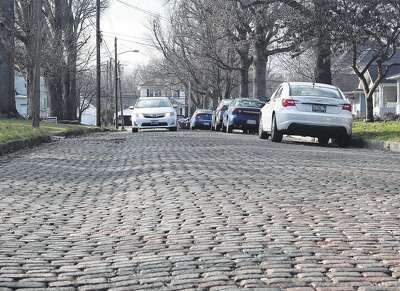- Report: Jim Carrey rumored to star in 'The Grinch 2'1.
- Grocer Hy-Vee buying County Market in Jacksonville2.
- Secret Service accuses Jacksonville man of making threats against...3.
- Police beat for Thursday, Sept. 74.
- Police say truck left former Jacksonville Developmental Center campus...5.
- Jacksonville winery renovating, retooling after franchise loss6.
- Longtime Roodhouse mayor passes; Martin remembered for his care for city7.
- Jacksonville couple setting table for downtown board game lounge8.
Most Popular
Brick road would save in long run, backers say

A national trade group is appealing to Jacksonville officials to keep the city’s last brick road, despite the fact needed repairs would cost substantially more.
Alderman have been discussing what to do with West Douglas Avenue. The road is in need of substantial repairs, but a feasibility study indicates reconstructing the road using brick would cost six times more than the standard asphalt. The study by Hutchison Engineering estimates reconstructing sections of West Douglas Avenue with brick — the option more than 50 percent of residents surveyed preferred and one that would retain the street’s historical significance — would cost more than $2 million. An asphalt overlay would cost $311,000.
Representatives of the Brick Industry Association, a national trade group with offices in Chicago, are urging city officials to look into what other cities have done to preserve their brick streets when considering the future of West Douglas Avenue.
Shannon Armstrong, community planner for the Brick Industry Association, said the average initial costs associated with brick replacements are high, but long-term maintenance savings would make those costs negligible.
An analysis in Fort Wayne, Indiana, found that the streets were lasting 18 years before maintenance was required.
"After about 18 years, on average, major work has to be done on asphalt roads, where brick roads can last upward of 100 years with very limited maintenance," Armstrong said. "You’re talking about removing bricks to the replace them. It’s a completely different maintenance routine. That’s where the savings come in."
Fort Wayne faced a similar situation except on a larger scale. Forty-one blocks of the city’s historic brick street needed replaced. The city used salvaged brick and by using volunteers and city staff restored an 8-by-12-foot section of sunken street to test the cost effectiveness brick.
The city decided it was more cost-effective to restore the brick streets than replace them with asphalt or concrete.
Armstrong said the projects are site-specific and Fort Wayne has greater access to resources for such a project. But she said brick could provide a more permanent solution that would allow Jacksonville to keep its historic feel while improving driving conditions along the road.
"You could certainly repave it with asphalt — that’s the quicker solution — but it’s not going to last long," Armstrong said. "Of course, there are some questions that the city will have. A lot of it has to do with labor. How much is going to cost and how long is it going to take? Talk to cities that have managed [these projects] and have assisted other communities the same way."
City council is still considering what will be done.
Nick Draper can be reached at 217-245-6121, ext. 1223, or on Twitter @nick_draper.
Nick Draper is a staff reporter for the Jacksonville Journal Courier
-
The Pike County Health Department has four flu clinics scheduled over the next two months at...
-
A Swansea man was being held Thursday in the Morgan County jail after a woman said she was...
-
A teenage boy was arrested after being accused of biting staff members and threatening to stab a...
-
A free U.S. citizenship preparation class will begin Sept. 26 at the Lincoln Land Community...








